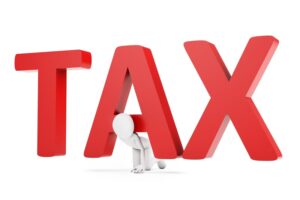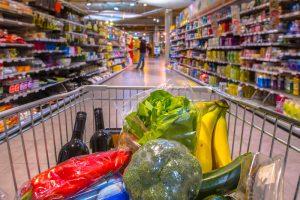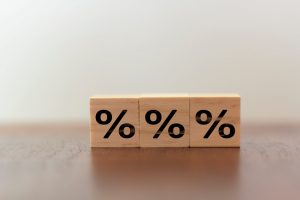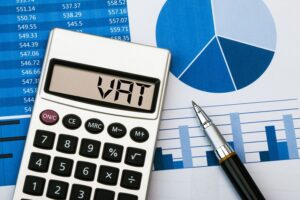
Waiting to be paid but still having to hand over VAT? The VAT Cash Accounting Scheme potentially lets you pay VAT only when your customer pays you, helping to ease cash flow pressures for small and medium-sized businesses.
This approach can offer
Read More
Businesses over £90,000 turnover must register for VAT, but HMRC may grant exceptions if the increase is temporary.
A business must register for VAT if either of the following applies:
At the end of any month, its taxable turnover in the previous
Read More
When considering VAT on entertainment provided solely to directors or partners of a business it is generally not recoverable as VAT Input Tax.
HMRC considers that directors and partners are not in need of entertainment to motivate themselves, so
Read More
Issuing a VAT invoice without registration or authorisation can lead to HMRC penalties, even if it is done by mistake.
A penalty may be charged by HMRC when an individual or business issues an unauthorised VAT invoice showing or including VAT
Read More
Not all goods and services carry a 20% VAT, knowing the right rate can save costly mistakes.
When a VAT-registered business issues an invoice to their customer, they must ensure that they charge the correct rate of VAT. Whilst most businesses in the
Read More
New rules mean late VAT filings and payments now trigger points, fines and interest charges.
The VAT late filing penalties regime changed for accounting periods beginning on or after 1 January 2023. Under the new system, there are now distinct and
Read More
HMRC requires businesses to maintain accurate VAT records to ensure correct tax payments. While all businesses must retain general records (such as invoices, bank statements, and receipts), a key requirement under the Making Tax Digital for VAT
Read More
VAT relief is available on goods and services for people with long-term illnesses or disabilities.
There are special VAT reliefs available for certain people living with disabilities or long-term illnesses. These reliefs are generally available on
Read More
Struggling with late-paying customers? The VAT Cash Accounting Scheme helps protect cash flow by taxing only what you have received.
The VAT Cash Accounting Scheme is designed to support businesses by improving cash flow. Using this scheme means
Read More
Streamline your VAT reporting with fewer returns and smoother cash flow. The Annual Accounting Scheme makes VAT easier to manage for eligible small businesses.
The VAT Annual Accounting Scheme is designed to simplify VAT reporting for smaller
Read More
Small business? The VAT Flat Rate Scheme could cut paperwork and improve cash flow. Pay VAT as a set percentage of turnover and enjoy simpler admin, budgeting ease, and even a 1% discount in year one of your registration for VAT.
The VAT Flat Rate
Read More
Not all VAT-free sales are the same. Understanding the key difference between zero-rated and VAT-exempt supplies could save your business money and prevent costly VAT mistakes.
It’s important to understand the distinction between zero-rated and
Read More
Considering VAT deregistration? Whether compulsory or voluntary, knowing the rules, deadlines and risks of delay can save your business from costly penalties.
The decision to deregister for VAT may be necessary or beneficial in a range of
Read More
The government is consulting on new VAT relief for goods donated to charities for free use. Could this fix an unfair gap in current rules? Have your say by 21 July 2025.
A new joint consultation from HM Treasury and HMRC, titled “VAT Treatment
Read More
The new VAT road fuel scale charges applicable from 1 May 2025 to 30 April 2026 have been published. The changes amend the VAT scale charges for taxing private use of road fuel to reflect changes in fuel prices.
HMRC has released new VAT fuel scale
Read More
Struggling with unpaid invoices? If you’ve paid VAT to HMRC but never received payment from your customer, you may be able to reclaim that VAT. Learn how bad debt relief works and whether switching to cash accounting could ease your VAT woes.
The
Read More
When selling a business, the Transfer of a Business as a Going Concern (TOGC) rules can allow the transaction to be VAT-free if key conditions are met. This prevents unnecessary VAT charges and ensures compliance with HMRC. Learn how TOGC applies to
Read More
Businesses owing over £2.3 million in VAT annually must make advance payments on account. These are based on the previous year’s VAT liability and paid in instalments. Late payments incur penalties, but adjustments may be possible for fluctuating
Read More
Using business goods instead of selling them is usually VAT-free, but some cases require VAT payments. These "taxable self-supplies" include cars taken from stock and certain buildings. Read on to see how to stay compliant.
If your
Read More
With a £90,000 VAT registration threshold, many UK businesses might wonder whether to register voluntarily. Understanding how to balance output and input VAT can help optimise cash flow and avoid costly mistakes with HMRC.
The current VAT
Read More
Health professionals providing medical services may be exempt from VAT if their work falls within their registered profession and primarily protects, maintains, or restores health. HMRC outlines specific exempt services, including diagnosis and
Read More
Businesses can reclaim VAT on pre-registration expenses if they relate to taxable supplies made after VAT registration. The rules differ for goods and services, with time limits of 4 years for goods and 6 months for services. Proper understanding
Read More
Reclaiming VAT on company cars isn’t as simple as it sounds. Generally, businesses can’t recover VAT unless the car is used exclusively for business purposes. But there are exceptions—like taxis, driving schools, and commercial vehicles. Here’s
Read More
Navigating VAT in the construction industry can feel like untangling scaffolding. Enter the VAT reverse charge—special rules that mean sub-contractors no longer charge VAT on services but contractors handle the tax instead. Here’s how it works
Read More
The VAT Flat Rate Scheme allows businesses to pay VAT as a fixed percentage of their total turnover, which includes VAT. The applicable percentage varies based on the business type. This scheme is designed to simplify VAT accounting, thereby reducing
Read More
When approaching the VAT registration threshold there are important matters to consider. The VAT registration threshold is the point at which businesses must register for VAT with HMRC.
A business must register for VAT if:
their total VAT taxable
Read More
The VAT treatment of motor expenses is an important concern for any business that incurs VAT on these costs. Below, we highlight key points to consider regarding the recovery of input tax (VAT) when leasing vehicles.
We have covered below some
Read More
There are special VAT reverse charge rules in place for certain building contractors and sub-contractors. These regulations, which came into effect on 1 March 2021, make the supply of most construction services between construction or building
Read More
The taxable turnover threshold for VAT registration is currently £90,000 and has applied since April 2024.
Businesses must register for VAT if they meet one of the following conditions:
At the end of any month, the value of taxable supplies made
Read More
There are special VAT rules that allow two or more companies or limited liability partnerships, commonly referred to as ‘bodies corporate’, to be treated as a single taxable person for VAT purposes known as a VAT group.
These bodies corporate can
Read More
The VAT penalty regime that applies to the late submission and / or late payments of VAT returns changed for VAT return periods beginning on or after 1 January 2023. Under the new regime, there are separate penalties for late VAT returns and late
Read More
More details have been published regarding Chancellor Rachel Reeves’ plans to impose a VAT charge on private school fees. The government has said that the money raised by ending the tax breaks on VAT, and business rates for private schools, will help
Read More
A new digital VAT registration tool has been launched by HMRC that can be used to help businesses work out the effects of registering for VAT.
The launch of the tool known as the VAT Registration Estimator came about following feedback from small
Read More
The VAT Annual Accounting Scheme is available to most businesses with an annual turnover of up to £1.35 million. Key benefits of the scheme include the obligation to file just one VAT return per year, which can greatly reduce administrative time and
Read More
The VAT Import One Stop Shop (IOSS) Scheme applies to goods imported in consignments with a value of £135 or less (known as low value goods) from countries outside the EU and Northern Ireland, to consumers in the EU, Northern Ireland, or both.
The
Read More
The taxable turnover threshold that determines whether businesses should be registered for VAT is currently £85,000. Businesses with turnover below this level can also apply for a voluntary VAT registration.
Businesses charge VAT on their sales.
Read More
In the UK most basic food stuffs are zero rated. However, the definition of ‘basic’ is not straightforward and many of the foods are zero rated as a result of historical legislation dating back to the introduction of VAT in 1973.
Famously, cakes are
Read More
The online service for checking a UK VAT number is available at: www.gov.uk/check-uk-vat-number.
This service can be used to check:
if a UK VAT registration number is valid; and
the name and address of the business the number is registered

There are special rules that determine the recoverability of VAT incurred before a business registered for VAT. This type of VAT is known as pre-registration input VAT. There are different rules for the supply of goods and services, but VAT can only
Read More
Business owners often refer to VAT as if it were a cost to their business regardless of their VAT position; whether they are registered for VAT or not.
If you are not registered for VAT, you do not have to add VAT to your sales and you cannot
Read More
Where an error on a past VAT return is uncovered businesses have a duty to correct the error as soon as possible. As a general rule, any necessary adjustment can be made on a current VAT return. To do this, the errors must be below the reporting
Read More
There are special VAT reverse charge rules for certain building contractors and sub-contractors. The rules, which came into effect on 1 March 2021, makes the supply of most construction services between construction or building businesses subject to
Read More
The check a UK VAT number service is available at: www.gov.uk/check-uk-vat-number.
This service allows users to check:
if a UK VAT registration number is valid; and
the name and address of the registered business.
The service also allows UK
Read More
The government is looking to introduce a new relief that would provide a VAT boost to charitable donations. The new VAT relief would be designed to encourage businesses to donate everyday items to charities without creating a VAT liability. A 12-week
Read More
VAT retail schemes are a special set of schemes used by retail businesses to account for VAT. The schemes are used by businesses that sell a significant amount of low value and/or small quantity items to the public with different VAT
Read More
There are special procedures for moving goods in and out of Northern Ireland. Under the Northern Ireland Protocol, all Northern Ireland businesses continue to have access to the whole UK market.
There is specific guidance published by HMRC that
Read More
The taxable turnover threshold that determines whether businesses should be registered for VAT will increase from £85,000 to £90,000 from 1 April 2024. The taxable turnover threshold that determines whether businesses can apply for deregistration
Read More
The VAT Flat Rate scheme is open to VAT registered businesses that expect their taxable turnover in the next 12 months to be no more than £150,000, excluding VAT. The annual taxable turnover limit is the total of everything that a business sells
Read More
The VAT Cash Accounting Scheme can offer useful benefits to small businesses. Under standard VAT accounting, VAT is payable on sales whether or not the customer has paid and can lead to claims for Bad Debt Relief. By using the VAT Cash Accounting
Read More
There are special VAT rules that allow businesses to standard rate the supply of most non-residential and commercial land and buildings (known as the option to tax). This means that subsequent supplies by the person making the option to tax will be
Read More
The VAT Flat Rate scheme allows businesses to pay VAT as a fixed percentage of their VAT inclusive turnover. The actual percentage used depends on the type of business. The scheme has been designed to simplify the way a business accounts for VAT and
Read More
Before Brexit, the UK was unable to zero rate VAT on women’s sanitary products under EU rules and the items were subject to 5% VAT. Following the end of the transition period the UK was no longer bound by the EU VAT Directive which mandated a minimum
Read More
The taxable turnover threshold that determines whether businesses should be registered for VAT is currently £85,000. The taxable turnover threshold that determines whether businesses can apply for deregistration is £83,000.
Businesses are required
Read More
If using the VAT Flat Rate scheme, businesses pay VAT as a fixed percentage of their VAT inclusive turnover. The actual percentage used depends on the type of business. The scheme has been designed to simplify the way a business accounts for VAT and
Read More
There are special rules to ensure that goods sent from abroad are taxed appropriately and to ensure that UK businesses supplying goods in the UK – for example by having to compete with VAT free imports – are not disadvantaged. This includes goods
Read More
HMRC’s VAT Notice 709/3 entitled ‘Hotels and holiday accommodation’ explains how supplies by hotels and similar establishments such as motels, guesthouses and B&Bs should be treated for VAT purposes. In addition, the notice covers the VAT
Read More
The taxable turnover threshold, which determines whether businesses should be registered for VAT, is currently £85,000. The taxable turnover threshold that determines whether businesses can apply for deregistration is £83,000.
Businesses are
Read More
The VAT Capital Goods Scheme (CGS) is a means of spreading the initial VAT recovery in respect of certain assets over either 5 or 10 years. The scheme seeks to agree a fair and reasonable attribution of VAT to taxable supplies and non-taxable
Read More
There are a number of conditions that must be satisfied for an activity to be within the scope of UK VAT.
An activity will fall within the scope of VAT when all the following conditions are met:
it is done for consideration;
it is a supply of

In most cases, a supply of goods or services for VAT purposes is deemed to have taken place in return for consideration. This is usually payment in money but can also be of a “non-monetary” nature, such as goods or services supplied in
Read More
The VAT treatment of motoring expenses is relevant to any business that incurs VAT on motor expenses.
We have covered below some important points to be aware of concerning the recovery of input tax (VAT) when leasing vehicles:
Leasing company
Read More
There are special rules to help ensure that goods sent from abroad are taxed appropriately. The aim is to not disadvantage UK businesses supplying goods in the UK, for example, by having to compete with VAT free imports. This includes goods that are
Read More
There are four options for the VAT treatment of road fuel costs.
Treat all of the VAT as input tax because 100% is used for business purposes. This option only applies to fuel for cars used exclusively for business purposes, such as pool
Read More
The taxable turnover threshold that determines whether businesses should be registered for VAT is currently £85,000. The taxable turnover threshold that determines whether businesses can apply for deregistration is £83,000. The thresholds are
Read More
The check a UK VAT number service is available at: www.gov.uk/check-uk-vat-number.
This service allows users to check:
if a UK VAT registration number is valid; and
the name and address of the business the number is registered to.
The service
Read More
A business that incurs expenditure on taxable and exempt business activities is partially exempt for VAT purposes.
This means that the business is required to make an apportionment between the activities using a ‘partial exemption method’ in order
Read More
The transfer of a business as a going concern (TOGC) rules concern the VAT liability on the sale of a business. Normally the sale of the assets of a VAT registered or VAT registerable business will be subject to VAT at the appropriate rate.
Where
Read More
The taxable turnover threshold that determines whether businesses should be registered for VAT is currently £85,000. Businesses with turnover below this level can also apply for a voluntary VAT registration.
Businesses charge VAT on their sales.
Read More
The Notification of Vehicle Arrivals (NOVA) is an online notification system for vehicles entering the country for permanent use on UK roads.
You can use the service if you are:
a VAT-registered business that does not use the secure registration
Read More
New simplified VAT guidance for overseas sellers has been published by HMRC. The guidance also includes a new translation into simplified Mandarin to help support Chinese retailers that sell goods online into the United Kingdom.
The guidance
Read More
The first monthly returns and payments affected by HMRC’s new VAT penalty regime were due by 7 March 2023. The new VAT penalty rules apply to the late submission and / or late payments of VAT returns for VAT return periods beginning on or after 1
Read More
The first monthly returns and payments affected by HMRC’s new VAT penalty regime are due by 7 March 2023. The new rules apply to the late submission and / or late payments of VAT returns for VAT return periods beginning on or after 1 January 2023.
Read More
The transfer of a business as a going concern (TOGC) rules concern the VAT liability of the sale of a business. Normally the sale of the assets of a VAT registered or VAT registerable business will be subject to VAT at the appropriate rate.
Where
Read More
If you are required to register your business for VAT purposes you are joining that reluctant band of business owners that are obliged to collect tax for HMRC.
The amount of VAT you have added to your sales, less VAT you have paid out on qualifying
Read More
The taxable turnover threshold, that determines whether businesses should be registered for VAT, is currently £85,000.
The taxable turnover threshold that determines whether businesses can apply for deregistration is £83,000.
It was confirmed as
Read More
The VAT One Stop Shop is an EU wide scheme that allows a VAT registered business to register in only one single EU Member State. The scheme was extended with effect from 1 July 2021. The extended scheme covers three special schemes: the non-Union
Read More
A new VAT penalty regime will affect all VAT registered businesses from 1 January 2023. The changes will apply to the late submission and / or late payments of VAT returns for VAT return periods beginning on or after 1 January 2023.
Under the new
Read More
There are special rules that determine the recoverability of pre-trading VAT costs. Pre-trading VAT costs describe VAT that was incurred before a business registered for VAT and is known as pre-registration input VAT.
There are different rules for
Read More
A business that incurs expenditure on taxable and exempt business activities is partially exempt for VAT purposes.
This means that the business is required to make an apportionment between the activities using a ‘partial exemption method’ in order
Read More
The ability to check a UK VAT number is available at: www.gov.uk/check-uk-vat-number.
This service allows users to check:
if a UK VAT registration number is valid; and
the name and address of the business the number is registered to.
The
Read More
A new VAT registration process known as the VAT Registration Service or VRS was made available to agents from 1 August 2022. The VRS had been in testing mode for the previous 18 months and was used by over 37,000 businesses to successfully register
Read More
Using the VAT Flat Rate scheme, businesses pay VAT as a fixed percentage of their VAT inclusive turnover. The actual percentage used depends on the type of business. The scheme has been designed to simplify the way a business accounts for VAT and in
Read More
The Making Tax Digital (MTD) for VAT regime started in April 2019 when businesses with a turnover above the VAT threshold of £85,000 became mandated to keep their records digitally and provide their VAT return information to HMRC using MTD compatible
Read More
The VAT domestic reverse charge accounting mechanism was put in place to help prevent criminal attacks on the UK VAT system by means of sophisticated fraud.
UK businesses receiving certain specified goods and services are liable to account for UK
Read More
Taxpayers that are owed VAT repayments by HMRC are entitled to claim statutory interest under certain circumstances. Where this is the case, a claim should be made in writing to HMRC. VATA s78 (11) requires all claims for statutory interest to be
Read More
The transfer of a business as a going concern (TOGC) rules concern the VAT liability on the sale of a business. Normally the sale of the assets of a VAT registered or VAT registerable business will be subject to VAT at the appropriate rate.
Where
Read More
The VAT Capital Goods Scheme (CGS) is a means of adjusting the initial VAT recovery in respect of certain assets over either 5 or 10 years. The scheme seeks to agree a fair and reasonable attribution of VAT to taxable supplies and non-taxable
Read More
Since 2018, online marketplaces (such as eBay or Amazon) have been required to help tackle online VAT fraud. These measures, known as joint and several liability (JSL) for marketplaces aim to ensure that all businesses selling goods in the UK follow
Read More
The VAT Flat Rate Scheme (FRS) has been designed to simplify the way a business accounts for VAT and in so doing reduce the administration costs of complying with the VAT legislation. The scheme is open to businesses that expect their annual taxable
Read More
HMRC’s VAT Notice 701/14: food explains what types of foods are zero rated and standard rated for VAT. The notice includes many examples of different food categories. The notice covers some general VAT liability rules. For example, food supplied in
Read More
Whilst most businesses in the UK charge VAT at the standard rate of 20%, there are a number of different VAT rates and exemptions that businesses should be aware of. In the UK, there are three separate VAT rates, the standard rate @ 20%, reduced rate
Read More
The furnished holiday let (FHL) rules allow holiday lettings of properties that meet certain conditions to be treated as a trade for some specific tax purposes. As an FHL is treated as a business, it is important to remember that VAT must be
Read More
The VAT Flat Rate Scheme has been designed to simplify the way a business accounts for VAT and in so doing reduce the administration costs of complying with the VAT legislation. The scheme is open to businesses that expect their annual taxable
Read More
When you issue an invoice to your customer, you must ensure that you charge the correct rate of VAT. Whilst most businesses in the UK charge VAT at the standard rate of 20% there are a number of different VAT rates and exemptions that you should be
Read More
VAT for most work on houses and flats by builders and similar trades, like plumbers, plasterers and carpenters, is charged at the standard rate of 20%. However, there are a number of exceptions where special VAT rules apply and a reduced or zero rate
Read More
For most fully taxable businesses, VAT can be reclaimed on goods and services used in the course and furtherance of their business activities. This means that businesses must consider where there is personal or private use of goods or services bought
Read More
A business that incurs expenditure on taxable and exempt business activities is partially exempt for VAT purposes. This means that the business is required to make an apportionment between the activities using a ‘partial exemption method’ in order to
Read More
There are special VAT rules that allow businesses to standard rate the supply of most non-residential and commercial land and buildings (known as the option to tax). This means that subsequent supplies by the person making the option to tax will be
Read More
The VAT domestic reverse charge accounting mechanism was put in place to help prevent criminal attacks on the UK VAT system by means of sophisticated fraud.
The domestic reverse charge procedure applies to the supply and purchase of the certain
Read More
The MTD for VAT regime started in April 2019 when businesses with a turnover above the VAT threshold of £85,000 became mandated to keep their records digitally and provide their VAT return information to HMRC using MTD compatible software.
From
Read More
There are special VAT rules that allow businesses to standard rate the supply of most non-residential and commercial land and buildings (known as the option to tax). This means that subsequent supplies by the person making the option to tax will be
Read More
There are special rules, under which a VAT-registered business can sell certain goods and services to charities at the zero or reduced rate of VAT. Before charging VAT at a lower rate, you must be able to show evidence that the charity is eligible.
Read More
There are special rules to help ensure that goods sent from abroad are taxed appropriately and to ensure that UK businesses supplying goods in the UK, for example by having to compete with VAT free imports, are not disadvantaged. This includes goods
Read More
The VAT Flat Rate scheme has been designed to simplify the way a business accounts for VAT and in so doing reduce the administration costs of complying with VAT legislation. Using the Flat Rate scheme, businesses pay VAT as a fixed percentage of
Read More
Making Tax Digital (MTD) for VAT is to be extended to cover businesses with a turnover below the VAT threshold from April 2022. The MTD for VAT regime started in April 2019 when businesses with a turnover above the VAT threshold of £85,000 became
Read More
Since 1 January 2021, businesses registered for VAT have been able to account for import VAT on their VAT return, often referred to as postponed VAT accounting. For most businesses, this means that they can declare and recover import VAT on the same
Read More
There are special VAT rules that allow two or more corporate bodies to be treated as a single taxable person for VAT purposes. This is known as a VAT group. Eligible persons are bodies corporate, individuals, partnerships and Scottish partnerships,
Read More
The VAT liability of the supply of driving lessons is an interesting issue that can be of relevance to other supply scenarios such as hairdressers and other workers in the beauty industry.
In HMRC’s internal manuals the guidance identifies three
Read More
The transfer of a business as a going concern (TOGC) rules cover the VAT liability on the sale of a business. Normally the sale of the assets of a VAT registered or VAT registerable business will be subject to VAT at the appropriate rate.
Where the
Read More
In general, VAT does not have to be accounted for on business gifts to the same person as long as the total cost of the gifts does not exceed £50 (before VAT) in any 12-month period. The definition of business gifts includes items from brochures,
Read More
There are a number of conditions that must be satisfied in order for an activity to be within the scope of UK VAT. One of the conditions that needs to be carefully considered when deciding whether an activity is within the scope of VAT is the concept
Read More
There are special VAT rules for building contractors and sub-contractors that came into effect on 1 March 2021. The new rules make the supply of most construction services between construction or building businesses subject to the domestic reverse
Read More
The transfer of a business as a going concern (TOGC) rules concern the VAT liability of the sale of a business. Normally the sale of the assets of a VAT registered or VAT registerable business will be subject to VAT at the appropriate rate.
Where
Read More
The VAT Flat Rate Scheme has been designed to simplify the way a business accounts for VAT and in so
Read More
It has been confirmed, by the Chancellor, that the taxable turnover threshold that determines whether
Read More
Businesses that use the flat rate scheme pay VAT as a fixed percentage of their VAT inclusive turnover.
Read More
The coronavirus VAT payment holiday gave businesses the chance to defer the payment of any VAT
Read More
The process for working out the VAT treatment of delivery charges can be quite complex.
We have listed
Read More
Where an error on a past VAT return is uncovered, businesses have a duty to correct the error as soon as
Read More
The coronavirus VAT payment holiday gave businesses the chance to defer the payment of any VAT
Read More
The VAT system is policed by HMRC who can and do levy penalties for breaches of the legislation.
There
Read More
The transfer of a business as a going concern (TOGC) rules concern the VAT liability on the sale of a
Read More